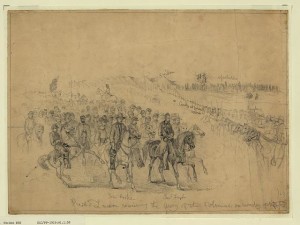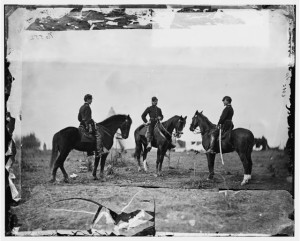Here a Richmond paper tries to make sense of various prognostications coming out of the Northern press.
From the Richmond Daily Dispatch April 22, 1863:
The wait and Watch System.
Several Federal journals intimate that no active hostilities on their part need be expected this spring, but that the North will stand on the defensive till autumn. Various reasons are assigned for this important modification of the “short-sharp, and decisive” It is alleged that the two years men, embracing a large number of their most efficient soldiers, will soon be discharged, and that their army generally is not in a condition to the aggressive, whilst the Southern army, on the other hand was never in a more efficient state, both as regards discipline and numbers. It is further asserted that the raise [rains?] and bad roads of this season in the South forbid a spring campaign, whilst summer operations, they have learned by experience are not to be thought of. During the summer they can gather in and drill their new conscripts, and by autumn be prepared to take the field once more and crush the rebellion. In the meantime their great hope is that the South will suffer from want of food and be so financially strangulated that, when the hour of battle comes we shall not be able to stand up against the over whelming masses of the enemy. They profess, also, to believe that, rather than wants [waste?] the interval in inaction, we shall attack them in their strongholds, when they will have all the advantages of a defensive position, and we shall suffer as they have whenever they have been the assailants.

the best offense is a good defense? – President Lincoln reviews the Army of the Potomac in early April 1863
Whether a particle of confidence ought to be placed in these prognostications, we leave to those who can see through the murky waters of Yankee deception to the bottom, to decide. Our Government and our Generals understand too thoroughly the army [?], tortuous ways of Yankeedom, to be put off their guard. All this may be only a prelude to some sudden and desperate rush of the Federal armies at a vital point of the Confederacy. It is impossible for us to put faith in anything these people say. It seems improbable that, if they intended to remain inactive during the spring and summer, they would inform us of it. Their real object, therefore, may be to full [lull?] us into a dream of security, and spring upon us as we sleep. If, however, their armies are so disorganized and demoralized that they cannot push on till next fall, what becomes of the late emphatic declarations of the New York Tribunes, that if the rebels were not conquered in three months, the North might as well give up the contest; and the threat of the Herald, that unless the rebellion were crushed before fall, Lincoln and his Cabinet ought to be impeached? Can the North afford to wait five or six months, with an enormous debt rolling up mountain high every day, on the fragile hope that the South will be starved or whipped out next fall? What reason have they to calculate on the South being starved out? Even if our condition were now as close on the borders of famine as their journals represent, how do they know but the same beneficent Providence which has hither to go [so?] interposed wonderfully in our behalf will not crown the labors of our husbandmen with plenty, and give us abundant harvests? As to their congesting us by any other mode than starvation, we do not believe they themselves after the experience of the past have the slightest confidence in such an achievement. If they wait till fall they need not expect that the North will be the only party prepared for the conflict. The South will avail itself of every hour of the interval to multiply its means of defence, till every hillside becomes a [?], and every valley a valley of the shadow of death to the invaders.
The press did not like price speculation (below the fold), but it sure did a lot of its own kind.
But it was true that some two-year regiments in the Union were scheduled to be mustered out at the end of May.

